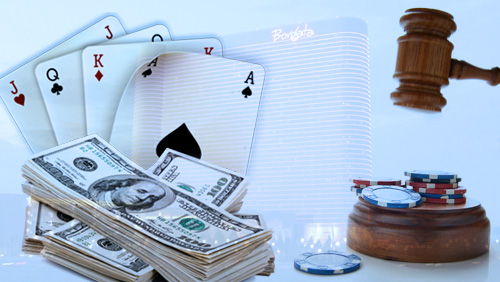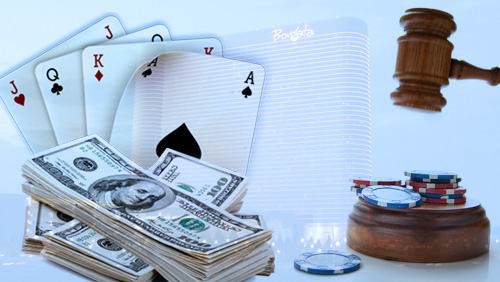The legal team representing poker player Jacob Musterel and 4,000 players affected by the 2014 Borgata ‘Chipgate’ Scandal have lost their appeal for greater remuneration against The Borgata’s parent company Marina District Finance Co. Inc.
 A crook creates $800,000 in fake poker chips, introduces them into a tournament; officials discover the swindle, the casino stops the competition and evaluates the best way to make everyone whole, the casino finishes the investigation and pays out – the players sue the casino.
A crook creates $800,000 in fake poker chips, introduces them into a tournament; officials discover the swindle, the casino stops the competition and evaluates the best way to make everyone whole, the casino finishes the investigation and pays out – the players sue the casino.
And that’s the world we live in ladies and gentlemen.
The land where if you try to make everyone happy you end up making everyone unhappy.
In 2014, 44-year old Christian Lusardi of Fayetteville, North Carolina, conspired to cheat his way to victory in a $2m Guaranteed event at the beginning of the Borgata Winter Poker Open by occasionally increasing his stack with counterfeit chips until the total of 800,000 additional chips were in play. Lusardi was one of the early leaders in the event but eventually busted after cashing for four figures.
Tournament officials, alerted by eagle-eyed poker players, stopped the event with 27 players remaining and entered into discussions with the Division of Gaming Enforcement (DGE) to figure out how to make players whole.
Christian Lusardi Caught With His Pants Down; DGE Issues Orders
Police identified the culprit when plumbers were called to deal with a plumbing complaint at Harrah’s Resort, Atlantic City, and found 1.2m in counterfeit chips dumped into the toilet of a hotel room belonging to one Christian Lusardi.
After the DGE had carried out their investigation, they determined that The Borgata had complied legally throughout the competition, and during the post game investigation. David Rebuck, division director, DGE ordered The Borgata to return $19,232 to each of the 27 remaining players, and $560 to each of the 2,143 entrants eliminated before the reaching the money that may have played on a table where fake chips were present.
Poker Players Sue Borgata Parent Company
The poker community didn’t necessary agree with the decision, especially those who were in a position to win the $300,000+ first prize. Shortly after the announcement was made Jacob Musterel filed a class action lawsuit against Marina District Finance Co. Inc (owners of The Borgata) on behalf of more than 4,000 players involved in the tournament hoping to see all buy-in fees, travel expenses, and hotel accommodations compensated in full. Musterel was one of the remaining 27 players left in the competition when the whole thing ground to a halt.
The lawsuit suggested that the introduction of fake chips unfairly inflated Lusardi’s stack giving him additional leverage to eliminate players creating a ripple effect that would affect the entire tournament. The legal team also impressed that tournament organisers were slow to act once players had highlighted the problem.
The plaintiffs appealed both the division’s order and the judgment dismissal of the case. Both appeals were consolidated.
The Borgata Fights Back
Tournament officials felt they did a great job.
The DGE felt the Borgata team had done a great job.
Battle lines were drawn, legal teams were selected, and the joust began.
Poker’s Tag of a Game of Chance Sways Final Decision
On Aug, 1, the Appellate Division decreed that the Borgata Hotel Casino & Spa and the DGE had done everything in their power to provide a fair and abrupt resolution to an event the judges called ‘regrettable.’
The court heard how the chieftains believed the plaintiffs had no legal basis for their claims. At the time of the lawsuit Bruce LiCausi, the legal eagle representing the plaintiffs, said:
“In my 31 years in practice, I have to say this is one of the cleanest claims we’ve had.”
Ironically, the judges said that because poker was a ‘game of chance’, none of the plaintiffs could demonstrate with any high degree of accuracy that they may have gone on and won the event.
“There is simply no fairly calculable award that would put these plaintiffs in as good a position as if performance had been rendered, and thus no basis for an award of compensatory damages.” The court heard.
The judge believed the DGE and the Borgata had ensured all players who won prize money kept it, those that didn’t receive their prize money did, the buy-in was refunded, and the remaining 27 players received an equal share of the remaining prize pool. And that was good enough for them.
“I think the director and his staff did the best possible job regarding being fair to everyone.” Gerard Quinn of Borgata’s legal team Cooper Levenson told reporters.
The man who started this sorry mess, Christian Lusardi, is currently spending five years in prison.






